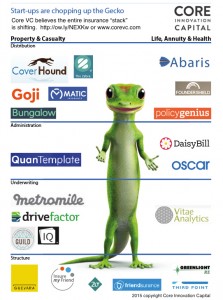At Core we’ve been getting more and more excited about insurance – not too worry, we’re not becoming actuaries anytime soon – and the potential for start-ups to disrupt that incredibly boring, but entirely gigantic whole industry.
I owe a special gratitude to Thomas Smyth – who dropped into Core on a lark and has left us in favor of another lark, but has also left us smarter about insurance, and a litany of other matter that passed before his able young eyes.
 We’re so excited — and had so many thoughts — that we wrote a whitepaper. You can download it here: Slicing Up the Gecko.
We’re so excited — and had so many thoughts — that we wrote a whitepaper. You can download it here: Slicing Up the Gecko.
The Cliff Notes: Insurance is going to be the next revolution in fintech. Just as start-ups have begun to dismantle retail banking, consumer-focused, technology-first companies will redefine how we shop for, purchase, use, and even think about insurance.
In this post I’d like to air some speculative ideas I’ve had about insurance, specifically for middle-class and working-class folks, and also explain why we care so much about such a hidebound industry.
Building a safety net for all Americans
Imagine the daily lives of Americans. What goes wrong? We get into car accidents; our roofs are blown away by hurricanes; our TVs are stolen; we die. These are the traditional problems that insurance tries to solve for. But there are others, aren’t there? Our cars break down unexpectedly. A phone is stolen. A job is lost, or hours cut back.
Many of the problems that cause folks to utilize incredibly expensive short-term credit can be alleviated by insurance – at a radically lower cost, basically by defraying the risk over a larger population. The trick is figuring out how to sell an extended vehicle warranty in a market in which all extended warranties today are scams, or how to sell a wage insurance policy that workers can actually believe in.
Aspiring to stability
I’ve been puzzling over a new Pew survey that asked Americans about their hopes and dreams in the context of their financial lives.
“When asked whether it was more important to them to have financial stability or to move up the income ladder, 92 percent of Americans choose security, an increase of 7 percentage points since 2011.”
The mythical ethos of America is that we are a nation of strivers: constantly trying to make it big, catch a break, risk it all to get ahead. Maybe this was always a myth — but it’s become even more mythical since the 2008 financial crisis and recession. Even during the so-called recovery (from 2011-2014), 7% of Americans — that’s 20 million people! — changed their priorities to focus on keeping what they have, not getting more.
Re-focusing on the big problems
That’s a big shift. Smart, new insurance and savings products should (and will) be created to meet this growing demand. With my investing hat on, I am excited about many of the deals Core is seeing.
With my civic hat on, I think: Many Americans are struggling. Many start-ups are working to alleviate the symptoms, but few are addressing the biggest problems. What does it mean to have a “good job” today? What kind of a life should the average American aspire to? What kind of economic systems and processes and, perhaps, companies can imbue the next generation with the grit, character, and creativity they need to flourish in a time of great technological progress — and economic upheaval?
I am optimistic that we will find a way, and that technology can help us build solutions to the biggest problems. But they are hard! How could technology solve unemployment, or reduce income inequality, or ensure an economic baseline for all Americans? As we have looked deeply at insurance, I am reminded again of how much change is yet to come — and how much possibility remains for growth and development.
@arjanschutte Insurance perhaps the most conservative of all FS sectors (partly for good reasons); but their customers are not. go figure..